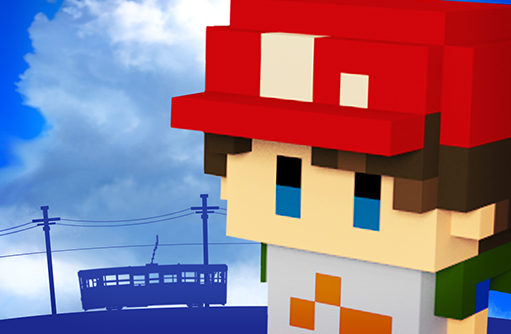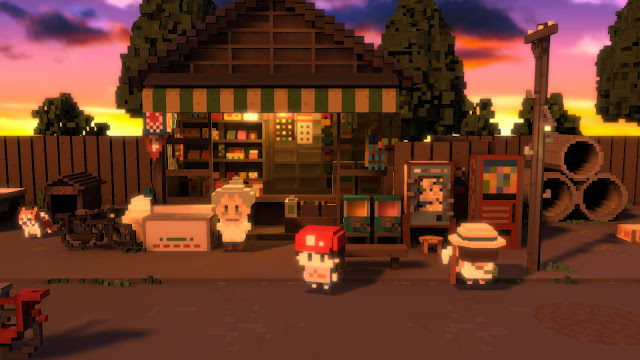You’ll laugh. You’ll cry. The warm aesthetics will warm you while the emotional narrative will often chill you. The Kids We Were is a pixelated Life Is Strange, or an animated Stephen King coming of age story. There’s a dash of Back To The Future, too, and all combined it’s pretty powerful stuff, and just the kind of experience that I wish we saw more of… but since it’s “only” six to eight hours long I’m guessing it’s going to be overlooked for not having enough content.
The entire point of playing this game is to be swept along with the narrative, and that makes even me, a person that usually has no patience for “spoilers” when they get in the way of a good discussion about art, pause. It’s not so much that the game’s filled with twists and turns, but rather it’s just loaded with moments this hit like a proverbial gut punch. What I will do instead is just describe the first chapter, and then assure you that the narrative escalates with some of the most incredibly mature writing I’ve seen in video games.
You play as a boy from a tragic family. His little sister is “very sick” (though not yet symptomatic), and the mother is frequently brought down with coughing fits. I know what that means. I studied cinema. I know the unwritten rule that the character that coughs is going to die. And then, on a trip to his father’s down (mother and father being separated), he discovers that his dad’s dead too. By happening across his grave. But then things get really strange. A wizened old priest gives our little tyke a mysterious notebook, which leads him to a broken down shrine, a dig site, and an odd machine. A machine that he discovers is a time machine when he, from 33 years in the future, tells him to go back 33 years to the past and change the future to save his family. Don’t think about it too much, as time travel stories always hurt the brain, but roll with it and it’s all pretty poignant and loaded with potency.
Point is, though, that you do end up doing the time travel thing, and winding up in the rockin’ 80’s, ready to get your Duran Duran on (note: it’s aa missed opportuntiy but Duran Duran is not actually in this game). That’s where I’ll stop explaining the story to avoid spoiling any of it, but yes, you will laugh, cry, and feel both uplifted and crushed by this game’s wonderfully evocative narrative. That narrative is supported by the voxel aesthetic, which is perfectly appropriate for the 80’s, as well as the careful precision with which all the characters, locations, and events are put together. The Kids We Were is an exercise in efficiency, and it doesn’t try harder than it needs to, but that earnest simplicity and humble approach gives it a quality that is refreshing given the context of the increasingly grandioise video game industry.
As a game, it’s one of those “click on everything” kinds of adventure games that mistake forcing players to scour every pixel for little treasures for being engaging design, but thankfully it’s not overloaded with puzzles, nor roadblocks to progress. Hints and directions are easy to follow, and while, yes, you do need to investigate everything, just in case an all-important coin was hidden away somewhere (not dissimilar to how you’ll tap on everything in the Layton games), environments are never too buy in The Kids We Were and the developers are careful to keep things moving at all times.
The main thing that you’re hunting for is not coins, though, but rather retro items from yesteryear Japan. It is fitting that a game set in the 80’s would go all-in with the nostalgic element, but The Kids We Were goes really heavy on it, and it’s nice that it’s releasing within the same ballpark time as Unpacking – a game itself that indulged nostalgia through the presentation of material items. It’s also worth keeping in mind, as you play The Kids We Were, that the 80’s represent a period that the Japanese remember with particularly potent rose-tinted glasses on. It was the height of the bubble economy and money (and rampant consumerism) flowed freely through the country. Japan was, perceptually (if not in reality) the wealthiest and most successful nation on earth through the 80’s, and the subsequent crash and “lost decade” was so shattering that those that grew up in the decade, even if they were too young to get a full sense of what was going on, certainly felt it, and now look back to the bubble as a warm and golden time. The Kids We Were does interesting things with that, without giving too much away, but the unique condition of Japan in the 80’s is important to keep in mind as you play to take the full impact away from the story.
It’s a succinct and heartfelt game with a gorgeous aesthetic and an evocative narrative. The Kids We Were seems destined to be a thing that people will overlook, but I really hope that they don’t. The way it taps into both a sense of nostalgia for youth and the Japanese nostalgia for the golden 80’s might not be the most original narrative angle ever, but it’s a story told so well that you won’t be able to put it down.










